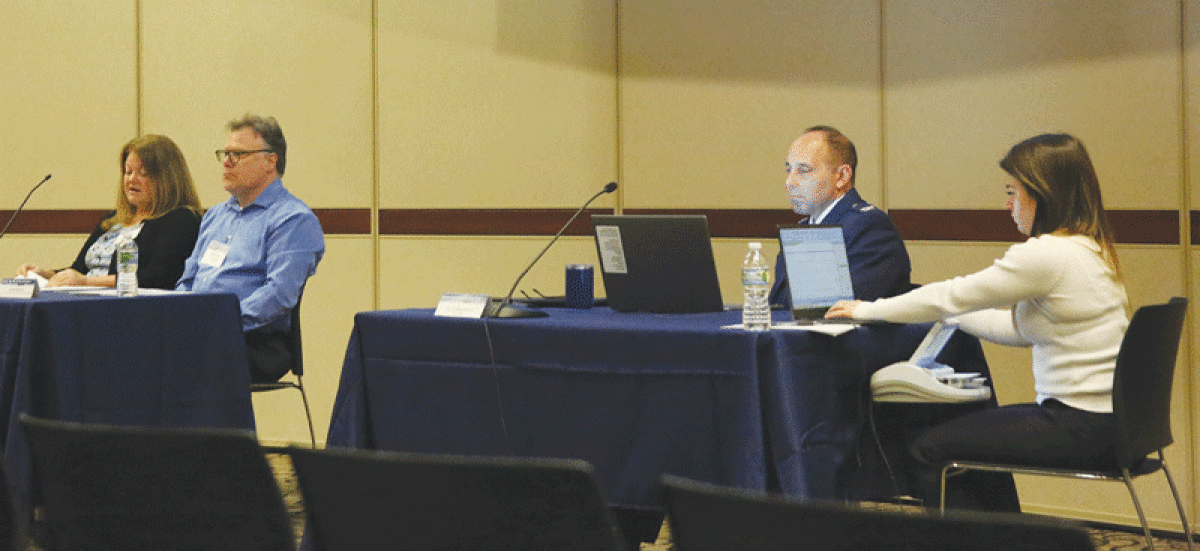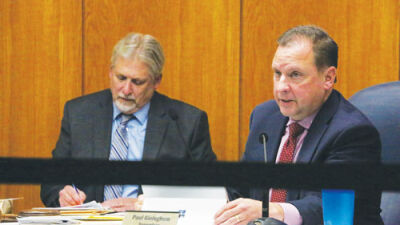HARRISON TOWNSHIP — The Department of the Air Force is considering Selfridge Air National Guard Base as the site of the foreign pilot training center for the F-35 fighter jet.
Prompted by Singapore wanting to house its U.S.-based F-16 and F-35 training facilities at the same base, the Air Force is examining Selfridge and Ebbing Air National Guard Base in Arkansas as potential sites for the relocated fleets and Foreign Military Sales (FMS) Pilot Training Center (PTC.) Singapore’s F-16 jets are currently kept at Luke Air Force Base in Arizona. The F-16 program will be limited to Singapore, while the F-35 program will train pilots from other countries buying F-35 jets.
As part of the selection process, an environmental review was performed to determine the effects of the F-35 and F-16 programs coming to Selfridge. This environmental impact statement (EIS) was completed and presented to the public at the Harry L. Wheeler Community Center and Administrative Offices on Sept. 28. A similar meeting in Arkansas was held on Sept. 21 and a virtual meeting was held on Oct. 5.
“(The National Environmental Policy Act) requires federal agencies to identify and consider the environmental consequences of implementing proposals that have the potential to impact the environment,” David Martin, FMS PTC EIS project manager for the Air Force Civil Engineer Center, said at the Sept. 28 meeting.
Selfridge is considered “Alternative 2” for the FMS PTC, compared to Ebbing as the “Preferred Alternative.” While both sites will need to install aircraft barrier arresting kits and other support facilities, Selfridge has the benefit of being a military-only airfield, while Ebbing shares space with a civil airport. If neither the Selfridge nor Ebbing are deemed sufficient, a “No Action Alternative” will be exercised. Existing operations at Selfridge will be unaffected by any alternative.
The EIS determined both sites would have significant noise impacts and negative effects on environmental justice in the surrounding area, resulting in “disproportionately high and adverse human health or environmental effects on minority, low-income, child and elderly populations adjacent” to the bases. For Selfridge, the effects were measured to occur within a north-south area parallel to the base’s Runway 01/19, affecting parts of Harrison and Chesterfield townships. The program moving to Selfridge would reduce surrounding air quality, pushing the area’s nitrogen oxide (NOx) pollution above the 100-ton annual threshold.
Attendees had a chance to freely speak with representatives from the Air Force and associated contractors after the EIS presentation, and public comments were heard from registered attendees. Commenters were mixed about the possibility of adding the F-16 and F-35 programs to Selfridge, including Macomb County Board of Commissioners Sergeant-at-Arms and District 10 Commissioner Barbara Zinner (R-Harrison Township).
Zinner expressed support for the addition at the hearing, stating that her concerns were addressed by speaking with several attendees. However, Zinner mentioned the next day that she was still concerned about the hazards posed by the F-35’s loud engines — since they have reached over 100 decibels in Vermont, a level the CDC compares to the sound level produced by an approaching subway train — and the possibility of accidents resulting from live-ordnance test flights.
“I don’t want our citizens hurt,” Zinner said on Sept. 29.
Environmental concerns not mentioned in the report were brought up by speakers, such as contamination by a group of chemicals known as PFAS, and other effects the move could have on the natural environment. One Harrison Township resident brought up the effects infrasound pollution could have on local bats.
A former Selfridge firefighter mentioned that there would need to be plans to deal with emergencies, such as a plane catching on fire or running out of fuel while airborne. The firefighter dealt with an instance of an F-16 being lost due to an in-air emergency.
Several of the supporters included Chesterfield Township Treasurer Kathy Elliott and Drema Isaac, president of the Selfridge Base Community Council.
“The proposal has the possibility of having an amazing impact on our local economy, which is important to many of our local residents,” Elliott said. “I do believe the significant mitigation efforts … have been considered fairly well, and I look forward to hearing more about that.”
The Air Force will announce its decision in the spring of 2023. Interested parties can submit public comments online at FMSPTCEIS.com or by mail to FMS PTC EIS Project Manager, AFCEC/CZN, 2261 Hughes Ave., Suite 155, JBSA Lackland, TX 78236-9853.
 Publication select ▼
Publication select ▼



















